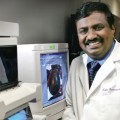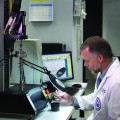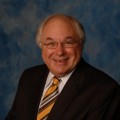NSU Newsroom
SharkBytes
Horizons
This version of NSU News has been archived as of February 28, 2019. To search through archived articles, visit nova.edu/search. To access the new version of NSU News, visit news.nova.edu.
This version of SharkBytes has been archived as of February 28, 2019. To search through archived articles, visit nova.edu/search. To access the new version of SharkBytes, visit sharkbytes.nova.edu.
Three Nova Southeastern University Researchers Receive Patents
Three Nova Southeastern University’s (NSU) professors from three different colleges recently secured patents for their innovations.
“The idea of a university is to further innovation, promote scholarship and ultimately benefit humanity,” said NSU President George L. Hanbury II, Ph.D. “Professors Rathinavelu, Thompson, and Harbaugh have developed new solutions to benefit the global community in their respective fields of pharmaceutical research, dentistry, and law, and I am proud to recognize them for their achievements.”
Appu Rathinavelu, Ph.D., associate dean for institutional planning and development at NSU’s College of Pharmacy, and executive director of NSU’s Rumbaugh-Goodwin Institute for Cancer Research, received a Japanese patent for developing a novel cancer treatment. The small organic molecule called “JFD” that he and his team discovered is anti-angiogenic, meaning it “starves” tumors and other cancer cells by preventing blood flow that supplies the tumors with oxygen and nutrients that would otherwise help them to grow and survive. This molecule is less expensive to manufacture, stable in storage, expected to be less toxic, and is more effective against solid tumors. It is specifically designed to battle breast, ovarian, prostate, lung and colorectal cancers.
Jeffrey Thompson, Ph.D., professor of prosthodontics and director of the Biosciences Research Center in NSU’s College of Dental Medicine, secured a U.S. patent for developing a surface modification technology to promote chemical bonding between high-performance ceramic materials like alumina and zirconia and biological materials, like tooth structures, and synthetic materials, like dentures and crowns. The research was conducted with a team of researchers from RTI International in Durham, N.C., and funded by a National Institute of Health (NIH)/National Institute of Dental and Craniofacial Research (NIDCR) grant.
Joseph Harbaugh, LL.M., professor of law and dean emeritus at NSU’s Shepard Broad Law Center, has received a U.S. patent for developing a computer-based system called AAMPLE®, the Alternative Admissions Model Program in Legal Education. The program reviews students’ outcomes in a small number of classes to predict their likelihood of excelling in law school and passing the state bar exam. This differs from the widespread practice of heavily weighing students’ LSAT scores and GPAs to determine admission to law school. AAMPLE is an alternate method to understand students’ abilities to think critically and succeed in law school and as professionals.
“These three patents illustrate NSU’s focus on developing novel, useful and relevant products and services to improve people’s lives,” said Gary S. Margules, Sc.D., NSU vice president for research and technology transfer.
- Appu Rathinavelu, Ph.D.
- Jeffrey Thompson, Ph.D.
- Joseph Harbaugh, LL.M.


